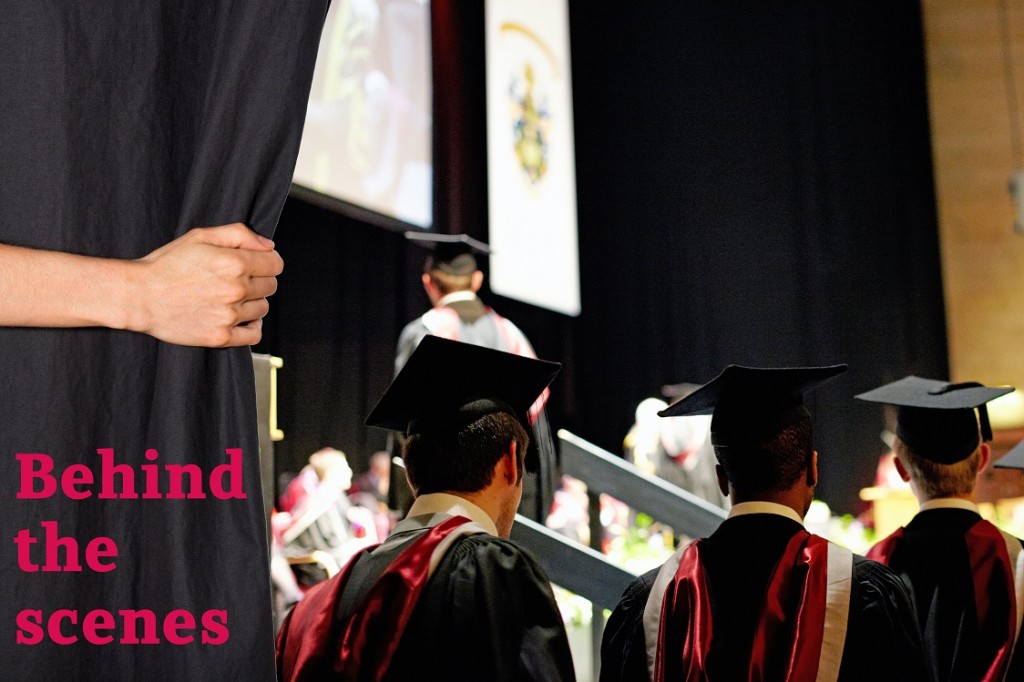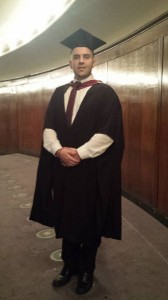A behind the scenes look at Corporate Systems’ involvement in the event
By Richard Rose
It’s the culmination of a student’s career at the University and a manically busy time for staff who are involved in organising the event. Graduation isn’t just a two week process though. The work which goes on to support it happens all year round and involves staff from many different areas working in partnership. Richard Rose takes us behind the scenes from a Corporate Systems perspective.
Our work falls into two areas: the first supports Sheffield Hallam’s business units in collecting information through Student Information (SI – the University’s student data management system). The second underpins the view that students see of ‘my student record’ and the way they update their information and book tickets for graduation.
Why our graduation system is different
Most universities with students starting courses at different times of year have staggered graduation dates. At Sheffield Hallam, we do things differently. We hold all our graduation ceremonies in November, irrespective of what time of year students embarked on their degrees. That creates a better atmosphere and a neater academic calendar but it makes the process a little more complex. Many students have a time lag between finishing their degree and attending graduation which presents two challenges. Firstly we have to pull data from different start years – (this year, last year and the year before last) – and then have to work out who has finished (but didn’t go to last year’s ceremony) and who we expect will finish in time with a ceremonial award.
Secondly, the University has to ‘keep students warm’ so they are still keen to come back for graduation – even if they finished their studies some months earlier.
In 2010, we purchased the Ceremony management component from SITS (the system which manages our Student Information). This allowed a lot of the organisation to be done online. It did not meet all our requirements so we have refined and upgraded it over the years to suit our needs – and every year we continue to make it work a bit better for us. We are unique as a University in running the ceremony management process from beginning to end (apart from payment) through SITS.
The annual graduation cycle – Corporate Systems input
In January we add what’s known as the ‘graduation container’ – a view of ‘my student record’ (which students can link to via blackboard) that shows when graduation will be. It also allows them to check and amend their details and make visa support letter requests if they need one to attend the ceremony.
In January, we also provide a programme which predicts how many students are likely to graduate by looking at all those who might be eligible and estimating the actual numbers. This is so that FD can book the graduation time slots at the city Hall and work out whether they need to run evening ceremonies as well as morning and afternoon ones. Faculties and Registry also need the information so they can do what’s called ‘the splits’ – working out the groupings of students and courses so that the optimum number of graduates and guests attend each ceremony.. The City Hall can cope with about 350 graduations per session.
In May, when we can begin to firm up numbers, the invitations start. We made a number of improvements this year to ensure where students’ names include non- English letters and symbols (such as umlauts, cedillas and accents) they show up correctly on invitations, certificates and in the ceremony booklet. Little things like that make a lot of difference. We provide a number of reports so that the Graduation Office and Registry can run queries to identify any problem areas before the student notices any issues.
In August, the booking process starts. It doesn’t all happen in the same system – payments go through REALEX and the information then comes back our ledger records – but that’s not obvious to students. As far as they are concerned, it’s all seamless.
The next part of the cycle is the ticketing, in October. Once bookings close, the system can be used to issue seat tickets and SI can produce reports and information downloads which make it possible to compile the graduation booklets and prize lists.
Then, in November, it’s the event that everyone sees – the live link is broadcast and watched across the University.
- In December, we review the whole process and look at ways to improve it for next year. We also consider possible changes in requirements in consultation with stakeholders.
And then it’s time to start the cycle all over again.
What’s it all about?
Over the last two weeks, 7,400 students booked 34,000 tickets to attend graduation. You’ve probably spotted them around Sheffield city centre looking proud and happy. Seeing them is a wonderful antidote to the November rain – and a valuable reminder of what we’re here to do.
A comment on the work we do:
Tricia Lee, FD Event Officer for Graduation, has this to say about the way her team works with Corporate Systems:
“The biggest part of graduation is getting our students to their ceremony; making sure they know what to do and when, showing them when their ceremony is as early as we can and ensuring the booking process is as easy as possible. We moved to an online booking system in 2010. A lot of people thought we would have a finished product but it doesn’t stop there, those involved in 2010 wouldn’t recognise the processes we use today. Enquiries from students decrease significantly every year. This is mainly due to the improvements made to the process, what happens behind the scenes and what they see on My Student Record.
Every year we come up with a list of improvements, we sit down after the ceremonies and present our wish list to Corporate Systems. Knowing the constraints of the system we don’t expect everything but the team always come up with suggestions or solutions. Developments are proposed and tweaked until we are all happy with the end product (the patience of a saint is needed sometimes). But it’s not just the developments we request that have changed the system; there have been a number of occasions where I have been approached by Corporate Systems with ideas for an easier, less time intensive way of running one of our processes. Richard proposed a development, changing the way students are invited this year – it saved staff in the graduation office 1 hour per day administration!”
Seeing it from the other side
Corporate Systems’ own Ian Clark was one of those graduating this year – which gave him an opportunity to experience the student’s side of the process. He commented ‘it’s been really interesting to see how some of the things we do are perceived by students and to notice the difference our improvements have made. I’ll be using that knowledge to inform some of the changes we will be making to the system for next year.’
Ian graduated with an MSc in IT & Management. He has been invited to give a seminar at next year’s Student Record Officer’s Conference in York as a result of the findings in his dissertation: The Effectiveness and Efficiencies of Business Processes. HESA: A Case Study.


![working in partnership7 [Converted]](https://blogs.shu.ac.uk/istnews/files/2014/11/working-in-partnership7-Converted-150x150.jpg)
